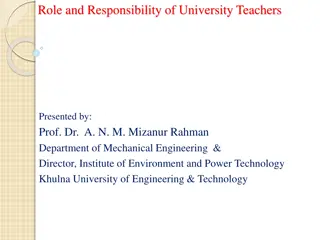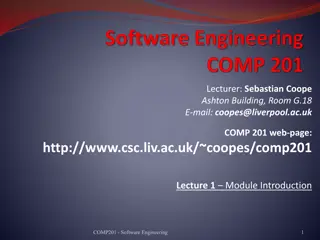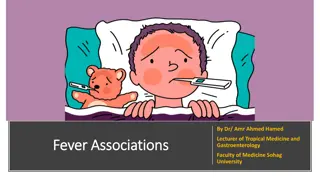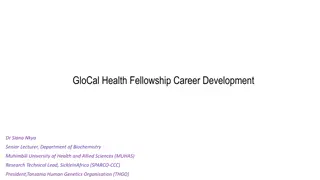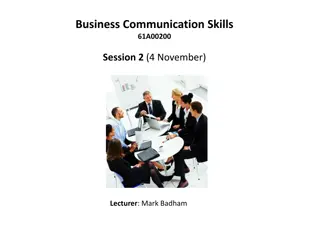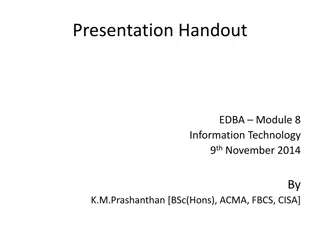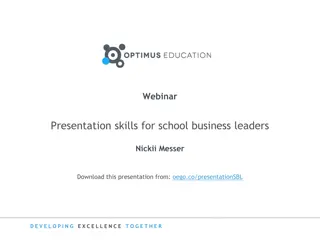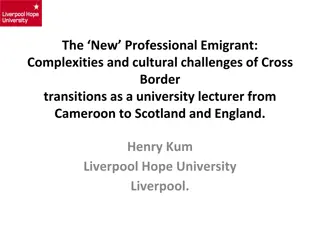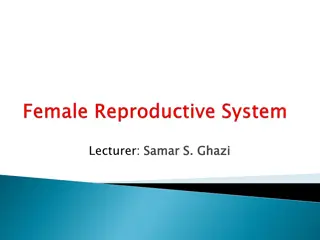
Developing Pedagogical Research at School Wilhelmiina Toivo
Explore ongoing and future pedagogical research initiatives at School Wilhelmiina Toivo, focusing on projects like Masking in HE Students and Supporting ESL Students. Delve into the importance of evaluating existing projects and the need for better support strategies for diverse student groups.
Uploaded on | 3 Views
Download Presentation

Please find below an Image/Link to download the presentation.
The content on the website is provided AS IS for your information and personal use only. It may not be sold, licensed, or shared on other websites without obtaining consent from the author. If you encounter any issues during the download, it is possible that the publisher has removed the file from their server.
You are allowed to download the files provided on this website for personal or commercial use, subject to the condition that they are used lawfully. All files are the property of their respective owners.
The content on the website is provided AS IS for your information and personal use only. It may not be sold, licensed, or shared on other websites without obtaining consent from the author.
E N D
Presentation Transcript
How I will contribute to and develop pedagogical research in the School Wilhelmiina Toivo
1. Existing projects - Masking in HE students - PsyTeachR evaluation 2. Future projects - Widening participation: Bilingual/English as a second language students
Existing projects within the School
Masking in HE students CPC-Q Masking/social camouflaging: attempting to enhance one s social compatibility by masking or compensating for features which might not be considered normal (Cage et al., 2018) Developing a new psychometric scale to measure masking in a wider context within HE students Project is currently in the data collection phase
Masking in HE students CPC-Q Masking/camouflaging leads to increased risk for fatigue, depression, anxiety and suicide (Cage et al., 2018; Cassidy et al., 2018; Lai et al., 2017). Increasing mental health crisis in HE (Storrie et al., 2010) - we need better identification of high risk students before escalation
PsyTeachR evaluation Need to evaluate and discuss the benchmark pilot study findings -> possibly need to adjust the task Qualitative part needs new collaborators I would like to contribute to progressing the evaluation
English as a Second Language students (ESL) English language ability introduces additional challenges (group work, lecture content and written assignments). This is prevalent among the MSc conversion students How can we support these student groups better? - Help available through LEADS but how can we lead as a School? Need for synchronous and asynchronous support for ODL ESL students
ESL students There is a negative correlation between foreign language anxiety and academic achievement (Botes, Dewaele & Greiff, 2020) Encouragement of independent strategies for advancing English proficiency (Cheng et al., 2004) -> What are the best strategies?
Lecture capture QAA collaborative cluster: Widening participation with lecture capture Some evidence suggests that English as a second language students performance was most improved by lecture capture (Shaw & Molnar, 2011) Lecture recordings are particularly used by English as second language students (Scutter et al., 2010) and they are perceived as very useful (Pearce & Scutter, 2010)
Lecture capture: potential research questions Focus beyond course performance How does lecture capture help manage English anxiety? What kind of lecture format/recordings are the most helpful and why? -> identify which aspects of this are the most vital for English as a second language speakers -> distance learning vs. flipped classrooms?
Group work University Learning & Teaching fund project for best practices in group work Challenges in group work with the face-to-face MSc conversion course ESL students generally contribute less in group work (Davies, 2009) Evidence suggests there are cultural differences and language barriers to group work (Freiermuth, 2001)
Group work: potential research questions How to effectively facilitate ESL students learning in groupwork contexts? Does online learning facilitate better group work with mixed language skill groups? (Freiermuth, 2001) Online environment seems to have introduced a new set of challenges -> identifying what the challenges are; are they different in online distance learning and flipped classroom?
My skills and expertise Very strong methodological background Research interest and expertise in bilingualism Three years of experience working as a part of the University Widening Participation Office
References Botes, E., Dewaele, J. M., & Greiff, S. (2020). The foreign language classroom anxiety scale and academic achievement: an overview of the prevailing literature and a meta-analysis. Journal for the Psychology of Language Learning, 2(1), 26-56. Cage, E., Di Monaco, J., & Newell, V. (2018). Experiences of autism acceptance and mental health in autistic adults. Journal of Autism and Developmental Disorders, 48(2), 473-484. Cassidy, S., Bradley, L., Shaw, R., & Baron-Cohen, S. (2018). Risk markers for suicidality in autistic adults. Molecular Autism, 9, 42. https://doi.org/10.1186/s13229-018-0226-4 Cheng, L., Myles, J., & Curtis, A. (2004). Targeting Language Support for Non-Native English-Speaking Graduate Students at a Canadian University. TESL Canada Journal, 21(2), 50 - 71. https://doi.org/10.18806/tesl.v21i2.174 Davies, W. M. (2009). Groupwork as a form of assessment: Common problems and recommended solutions. Higher Education, 58(4), 563-584. Freiermuth, M. R. (2001). Native speakers or non-native speakers: Who has the floor? Online and face-to-face interaction in culturally mixed small groups. Computer assisted language learning, 14(2), 169-199. Lai, M.-C., Lombardo, M. V., Ruigrok, A. N., Chakrabarti, B., Auyeung, B., Szatmari, P.,Happ , F., & Baron-Cohen, S. (2017). Quantifying and exploring camouflaging in men and women with autism. Autism : The International Journal of Research and Practice, 21(6), 690 702. https://doi.org/10.1177/1362361316671012 Pearce, K., & Scutter, S. (2010). Podcasting of health sciences lectures: Benefits for students from a non-English speaking background. Australasian Journal of Educational Technology, 26(7). Scutter, S., Stupans, I., Sawyer, T., & King, S. (2010). How do students use podcasts to support learning?. Australasian journal of educational technology, 26(2). Shaw, G. P., & Molnar, D. (2011). Non native English language speakers benefit most from the use of lecture capture in medical school. Biochemistry and Molecular Biology Education, 39(6), 416-420. Storrie, K., Ahern, K., & Tuckett, A. (2010). A systematic review: students with mental health problems a growing problem. International journal of nursing practice, 16(1), 1-6.





